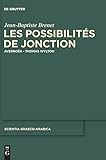Les possibilités de jonction : Averroès - Thomas Wylton / Jean-Baptiste Brenet.
Material type: TextSeries: Scientia Graeco-Arabica ; 10Publisher: Berlin ; Boston : De Gruyter, [2013]Copyright date: ©2013Description: 1 online resource (371 p.)Content type:
TextSeries: Scientia Graeco-Arabica ; 10Publisher: Berlin ; Boston : De Gruyter, [2013]Copyright date: ©2013Description: 1 online resource (371 p.)Content type: - 9783110315066
- 9783110315172
- 181/.92 23
- B749.Z7 B74 2013eb
- online - DeGruyter
- Issued also in print.
| Item type | Current library | Call number | URL | Status | Notes | Barcode | |
|---|---|---|---|---|---|---|---|
 eBook
eBook
|
Biblioteca "Angelicum" Pont. Univ. S.Tommaso d'Aquino Nuvola online | online - DeGruyter (Browse shelf(Opens below)) | Online access | Not for loan (Accesso limitato) | Accesso per gli utenti autorizzati / Access for authorized users | (dgr)9783110315172 |
Browsing Biblioteca "Angelicum" Pont. Univ. S.Tommaso d'Aquino shelves, Shelving location: Nuvola online Close shelf browser (Hides shelf browser)

|

|

|

|

|

|

|
||
| online - DeGruyter Schmerz : Über die Beziehung physischer und mentaler Zustände / | online - DeGruyter "Der Mensch hat das Wort" : Der Sprachdiskurs in der Frankfurter Zeitung 1933–1943 / | online - DeGruyter Covenants und Insolvenz : Risiken covenant-gesicherter Kreditgeber im Falle der Insolvenz des Kreditnehmers / | online - DeGruyter Les possibilités de jonction : Averroès - Thomas Wylton / | online - DeGruyter Differente Plausibilitäten : Kant und Nietzsche, Tolstoi und Dostojewski über Vernunft, Moral und Kunst / | online - DeGruyter Nietzsche, Wagner, Europe / | online - DeGruyter The Milesians. Volume 1, Thales / |
Frontmatter -- Table -- Les possibilités de jonction Averroès – Thomas Wylton -- 1 La question -- 2 L’âme humaine et la nature de l’intellect «matériel» -- 3 L’intellect agent hors de l’âme -- 4 Le rapport de l’intellect et du corps -- Thomas Wylton L’âme intellective Texte latin en vis-à-vis Avant-propos, traduction et notes -- Avant-propos -- Texte et traduction -- Notes de la traduction -- Indications bibliographiques -- Abréviations -- Sources -- Littérature secondaire
restricted access online access with authorization star
http://purl.org/coar/access_right/c_16ec
This book is an essay - with an annotated translation - about the psychology of Averroes, Aristotle’s Commentator, and its influence in Latin philosophy. It specifically addresses his famous doctrine of the intellect, long deemed scandalous, and its critical defence by one of his epigones, the English XIVth century theologian Thomas Wylton, also descended from the great scholastics Albert the Great, Thomas Aquinas and Duns Scotus. On new textual bases, the author tackles some of the main noetic questions of Greco-Arabic peripateticism: the relation between soul and body, the status of imagination, the nature of the intellect’s power, the autonomy of the thinker, or the theoretical accomplishment of the individual as conjunction with the “agent” intellect. The author argues that Wylton’s averroism is a conceptually consistent exegesis, an indiosynchratic combination of various elements found in Ibn Rushd’s system, while also, against a depreciatory tradition, contextualizing Averroes and his doctrine in relation to the active field of modern philosophy, within an identical rationality.
Issued also in print.
Mode of access: Internet via World Wide Web.
In French.
Description based on online resource; title from PDF title page (publisher's Web site, viewed 28. Feb 2023)


